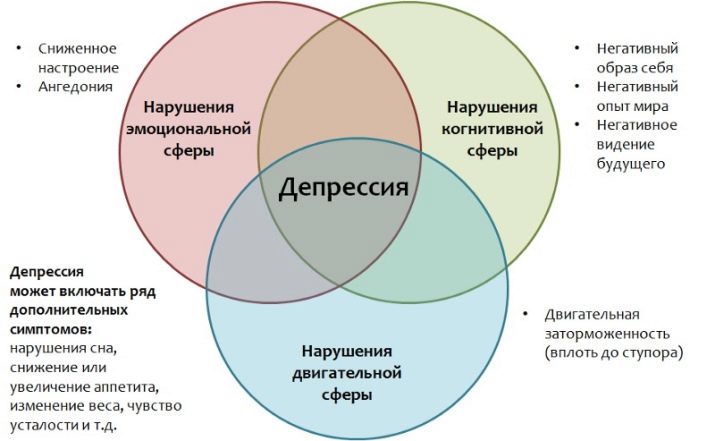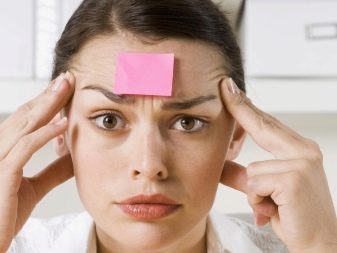What does the depressive triad include and how to get out of it?

Sometimes a person who is in depression feels a sharp change in their own behavior, thinking and general emotional background. He seeks help from a psychologist or psychotherapist. The specialist diagnoses the depressive triad.

What it is?
The term "depressive triad" is notable for its ambiguity. In all cases it means the unity of the three main manifestations of the suppressed state of the individual. Some experts combine the characteristics of a depressive disorder in three: melancholy, apathy and anxiety. The triad of V.P. Protopopov contains a complex of symptoms typical of manic-depressive psychosis. The condition is typical for people in melancholic depression. Protopopov's syndrome is based on the predominance of signs closely related to the tone of the sympathetic segment of the autonomic nervous system. This is a rapid heartbeat, dilated pupils and constipation.
A. Beck's triad includes depressive mood, decreased physical activity and negative opinion about oneself. The cognitive triad involves an individual's negative interpretation of personal life experience. The subject during depression has negative ideas about himself, about current events and about his future. The patient sees the cause of his feelings in personal psychological, moral and physical disabilities.
The depressed patient believes that life imposes on him unreasonably high demands and creates insurmountable obstacles to achieving the desired goal. He is confident that this suffering will last forever, and no good events await him in the near future.

Some experts distinguish between the harmonious, disharmonious and dissociated triad of depression. Most psychologists and psychiatrists call the depressive triad a set of inhibited states that affect the affective, mental and volitional areas.
- Lowered mood accompanies the subject for an extended period. The individual is not able to emotionally experience various situations, to lead an active life. He experiences constant longing and sadness. A person is constantly tormented by remorse, a feeling of his own inferiority. He blames himself for failure, for making many mistakes when making important decisions. The personality does not feel its own significance, is engaged in self-flagellation. Self-esteem falls catastrophically. As a result, interest in everything that happens is lost, the meaning of life is lost, the number of social contacts is reduced, and memory deteriorates. There is disharmony and imbalance in the perception of the environment.
- Lethargy mental activity often accompanied by a feeling of unnaturalness and unnaturalness of the events taking place, unclear thoughts, emptiness and fog in the head. The writer loses the ability to compose, the accountant - to count, the lecturer - to speak in public and improvise. A person cannot concentrate. He feels stiffness and a slow flow of thoughts, on the way of which insurmountable obstacles arise. Reservations, corrections, additions and clarifications appear in the speaker's speech. The subject cannot memorize and assimilate information. Creative and intellectual abilities are significantly reduced. Some people lose the ability to reproduce their previous experience. Focusing on your own depression generates a lot of negative thinking. A person cannot follow the course of the interlocutor's monologue. Curiosity, insight, ingenuity and ingenuity disappear. Sometimes it is difficult for a subject to cope with a life situation, especially when it is necessary to accelerate the pace or make a non-standard decision.
- Motor retardation includes a decrease in general tone, strength and energy. The personality is acutely experiencing the feeling of loss of their volitional abilities. A person cannot be active. Some people stop taking care of their appearance, taking care of themselves, and observing hygiene. They spend most of their time lying or sitting. The presence of other people weighs on the depressed subject, who is fixated on his own experiences and suffering. He loses his appetite, stops caring for loved ones. He is ashamed of his helplessness and inaction, but a person cannot correct the situation.
Along with motor retardation, the individual's gait and handwriting change. A dull look, a mournful look, drooping corners of the mouth radiate hopelessness, longing and complete despair.

Symptoms
Experts identify a number of symptoms that are most characteristic of depression:
- stiffness of thinking;
- general weakness, loss of strength, lethargy;
- emotional exhaustion;
- apathy, indifference, a decrease in interest in the outside world;
- loss of appetite, change in taste preferences;
- weight loss or gain;
- insomnia or, conversely, drowsiness;
- increased anxiety, panic attacks;
- strong impressionability and heightened sensitivity;
- outbursts of extreme irritation and affect, anger;
- impatience, unwillingness to make concessions;
- poorly controlled aggression, lack of self-control;
- memory loss, decreased concentration;
- depletion of vocabulary, the onset of degradation;
- difficulties in communicating with people;
- high blood pressure, tachycardia, dry mucous membranes.


Causes and treatment
Most often, the triad of depressive syndrome occurs as a result of a traumatic situation... The emergence of the classic depressive triad is usually preceded by setbacks associated with bankruptcy, a sharp drop in income, dismissal from work, protracted conflicts, sexual harassment, abuse, various troubles and disappointments. The reason is a serious illness or death of a loved one, a change of residence, retirement, sudden changes in life, divorce or separation from a loved one. It is extremely rare that a depressive state is observed in a subject who has successfully achieved his main goal. Sometimes a person loses the meaning of existence, because for a long time in his life there was only one idea or dream.
Biological factors include hereditary predisposition, various head injuries and side effects of drugs. Sometimes a violation of the daily routine, chronic fatigue, prolonged stress, a lack of hormones or vitamins introduce a person into a depressive state. Depression is a mental disorder that requires specialist intervention. The help of a psychologist or psychotherapist is necessary to consider and study all traumatic situations for the soul, their awareness and acceptance of the problem. It is very important for the patient to tune in to a positive mood, show patience and perseverance.
Psychologists usually devote a lot of time and attention to raising self-esteem. They recommend finding yourself a support group on social media. A person must reconsider their values, clear their own thoughts of doubts, get rid of unnecessary things. It is advisable to get out into nature more often, to be in the fresh air. Any creative activity gives vitality and energy. Singing, dancing, drawing, embroidery, knitting, music and other interesting hobbies perfectly improve mood and significantly increase self-esteem. Getting rid of the classic depressive triad will require drug therapy. It is aimed at normalizing the state of the nervous system, activating psychomotor skills, restoring the biochemical background, eliminating apathy and anxiety, as well as preventing mental fatigue and tearfulness.
Medicines can only be prescribed by mental health professionals.









